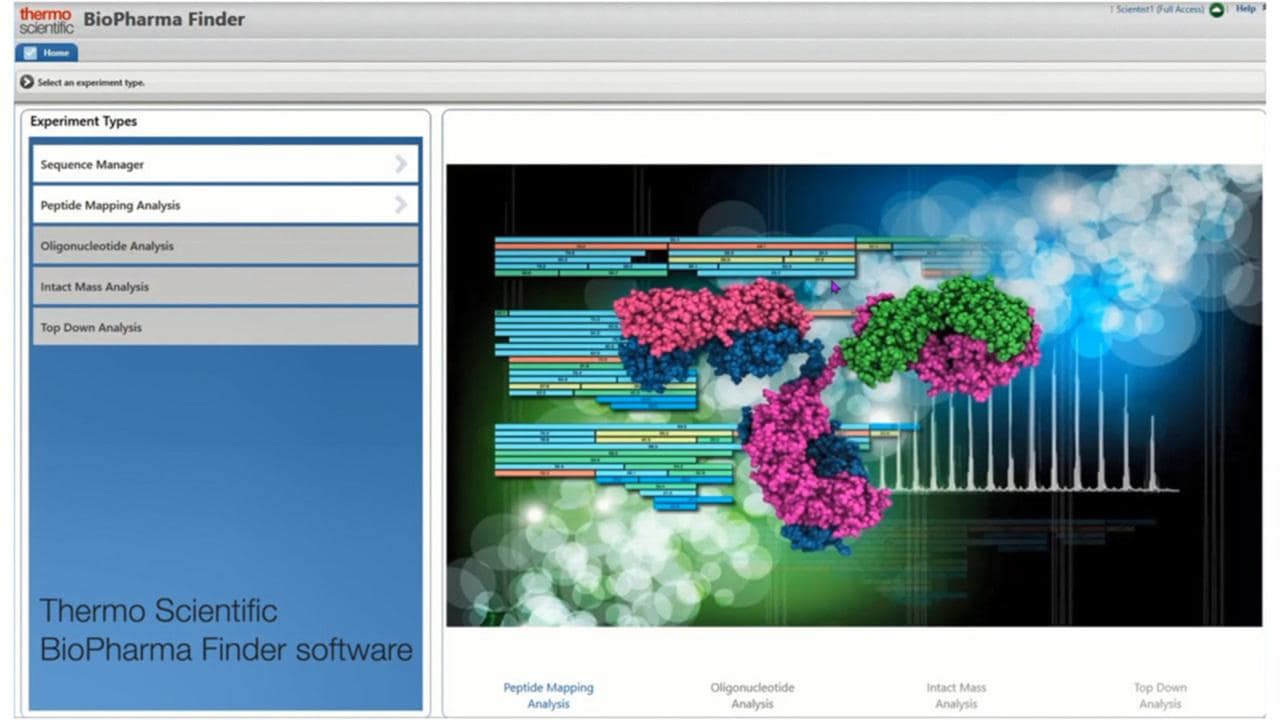Search

Complex biopharmaceutical characterization
Discover how the features of Thermo Scientific BioPharma Finder Software are engineered to support the world of complex biopharmaceutical characterization.
Featuring novel data processing algorithms and easy-to-interpret data visualization tools, the software supports users looking to confidently characterize biopharmaceuticals.
Power BioPharma Finder Software with the Thermo Scientific Ardia Platform to automate file centralization during acquisition, expand file access, enable report creation and result sharing, and remove data management barriers from your daily routine.
Benefits
Confident characterization: Explore a solution for confident animo acid sequence characterization with the Peptide Mapping Analysis module featuring a novel MS2 prediction algorithm.
Customized nucleotide sequence support: Leverage the ability to create customized nucleotide sequences to support confirmation with the Oligonucleotide Analysis module featuring an improved MS2 fragmentation model (available in BioPharma Finder Software version 5.3).
Efficient data handling: Move through vast amounts of data with remarkable efficiency using the Intact Mass Analysis module. With innovative deconvolution algorithms and features, you can generate multi-consensus reports effortlessly, providing a comprehensive view of your results.
Unparalleled modification exploration and flexibility: The Top-Down Analysis module empowers you to search through an extensive range of modifications, even at the per-peak level. With multiple fragmentation modes and a cross-array processing algorithm, you have the flexibility to explore your samples in greater detail.
Seamless integration: See how easy it is to move from sophisticated characterization using BioPharma Finder Software to confident quantitation in Thermo Scientific Chromeleon CDS software with benefits added by the Ardia Platform including connecting instrument data, supporting global access and centralizing BioPharma Finder reports.
Learn more
Learn more about BioPharma Finder Software
The right combination of data and software makes all the difference in accurately characterizing molecules, especially for large molecule. Expand the menu to learn about the key features in our BioPharma Finder applications workflows.
Detect and quantify host cell proteins
The sensitivity of the detection algorithm and prediction analytics allow for high confidence even for low abundance targets to support residuals applications like Host Cell Protein (HCP) analysis.
Detect and quantify host cell proteins
The sensitivity of the detection algorithm and prediction analytics allow for high confidence even for low abundance targets to support residuals applications like Host Cell Protein (HCP) analysis.
Streamline Hydrogen Deuterium Exchange workflows
Biopharma Finder Software automates protein folding studies with Hydrogen Deuterium Exchange (HDX) data analysis automation tools.
Identify product quality attributes with high-throughput analytics
BioPharma Finder Software can be used to identify and evaluate relevant product quality attributes (PQAs). Using the built-in peptide workbook, information can be easily transferred and then monitored across multiple samples throughout drug development. Alternatively, for compliant monitoring of critical quality attributes (CQA), the PQAs can be seamlessly transferred to Chromeleon CDS as part of a multi-attribute method (MAM).
Oligonucleotide analysis
Sequence confirmation for oligonucleotides can be daunting. Take the question out of sequence confirmation with our enhanced MS2 predictive algorithms that can iteratively create the best array of possibilities without iterating into infinity. Summarize your characterization with visual tools, generate easy-to-interpret results and enhance collaboration by saving and sharing reports in a connected environment.
Featured in the Oligonucleotide Analysis module
Featured in the Intact Analysis module
Connect and power BioPharma Finder Software with the Ardia Platform
Connect and power BioPharma Finder Software with the Ardia Platform
Living in a world connected by networks that enable people to share everything doesn’t have to stop in the lab. With the Ardia Platform see how easy it can be to automatically centralize files, connect into those files from anywhere and process them with BioPharma Finder Software or any connected application.
Featured enhancements through connection
Enable collaboration on a global scale in a secure fashion to collaborate, compare, track, and finalize peptide results and workbooks using dynamic versioning history. Accelerate method optimization and review through a shared secure environment.
Featured resources
Resources
For Research Use Only. Not for use in diagnostic procedures.




